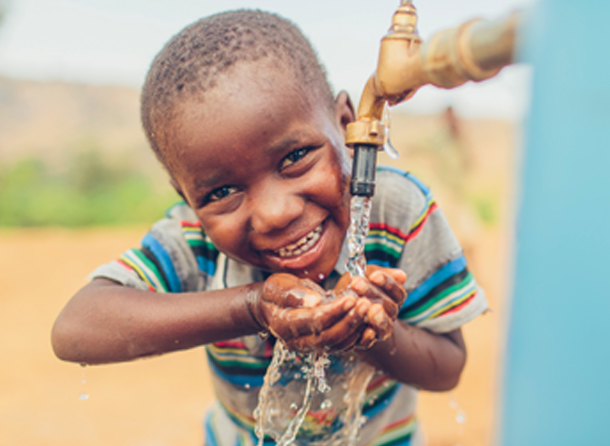 A Malawian boy experiences his first taste of safe water; photograph courtesy of Water Mission March 22, 2017 Thirst Quenchers Water Mission brings clean water to communities around the globe—and you can help during this Saturday’s Walk for Water written by Lauren Johnson For some, navigating the waters of foreign aid is murky business; for Molly and Dr. George Greene III, founders of Water Mission, the path is crystal clear. What began in 1998 as a reaction to Hurricane Mitch’s destruction in Honduras has evolved into a $17-million-a-year outpouring of safe water solutions in developing countries. Since its establishment as a nonprofit in 2001, the organization has obtained five patents for its Living Water Treatment System and quenched the thirsts of some 3.3 million people. But for Molly, the watershed moment will forever be standing on the banks of Honduras’s “river of death” in ’98, sipping the first drops of clean water pumped through her chemical engineer husband’s “grown-up science project.” She recalls, “The minute they saw us drink that water, hundreds in the community came surging forward.” Now, from 10 international offices as well as a 43,000-square-foot, solar-powered facility on the former Charleston Naval Base, Water Mission employs nearly 300 people in its philanthropic endeavors. Using a rugged filtration setup that can be operational within hours, the group quickly pours aid into countries crippled in the wake of natural disasters. Water Mission staff and volunteers were on the ground within weeks when a tsunami slammed into Thailand and days after devastating earthquakes shook Haiti and Nepal. They’ve even answered cries for help at home with catastrophes like Hurricane Katrina and the fall 2015 flooding in Columbia. “Truthfully, we think every day is a disaster for the 1.8 billion people without access to safe water,” remarks Molly, noting that filling this basic human need can open the floodgates to better health, education, and employment. It’s for that reason that Water Mission establishes sustainable water treatment systems that can be permanently maintained by a country’s indigenous people—to date, there are 2,300 such systems in Africa; Asia; North, South, and Central America; and the Caribbean. Furthermore, they have become a service provider for the United Nations’ Children and Refugee Relief Divisions, notes director of marketing Sandy Funk. Stationed at points along the Northern Uganda border, the organization has served upwards of 50,000 Sudanese refugees seeking asylum. In Tanzania, Water Mission and UNICEF united to install four 15,000-liter tanks, 10 filtration units, and nearly five miles of distribution pipe that provide water to 25,000 refugees per day. Last December, the charity announced its collaboration with Denmark-based Poul Due Jensen Foundation to construct the world’s largest solar-powered pumping solution in Western Tanzania, so that safe water can be delivered to 250,000 more Congolese and Burundian refugees. On March 25, to bring awareness to the global water crisis, Water Mission hosts its annual Charleston Walk for Water. The fundraiser takes bucket-toting participants on a three-mile journey symbolic of the trek that billions of people make daily to collect unsafe water. For Molly, the event refreshes her sense of purpose. “Why am I here, able to drink the cleanest water in the world, when elsewhere, people walk hours a day to get water that we wouldn’t give to our pets?” The Charleston Walk for Water is at 9 a.m. this Saturday, March 25, at Brittlebank Park. To register or donate, click here. To read about more folks doing good in our community, click here.
|
|
|
|

